Happy 97th Birthday to Col Alan Earp, OC
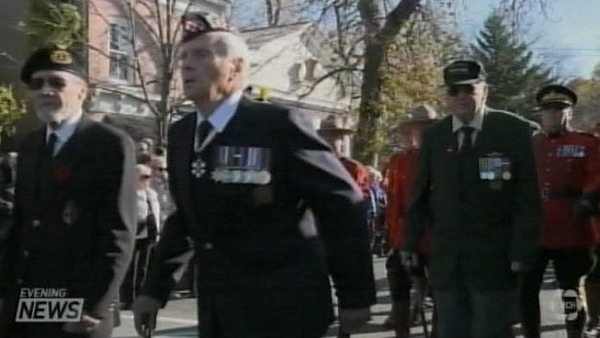 Col Alan Earp, OC, at the 2014 Remembrance Day Ceremony in Niagara-on-the-Lake.
Col Alan Earp, OC, at the 2014 Remembrance Day Ceremony in Niagara-on-the-Lake.
Click HERE to watch a CHCH video report about the event, including an interview with Col Earp.
Message from the Commanding Officer & Honorary Colonel
18 February 2022
Dear fellow Argyll,
Today is a special day. It marks the 97th birthday of Col Alan Earp, OC. He commanded the Pioneer Platoon from November 1944 to 14 April 1945, when he was severely wounded at Friesoythe, Germany. He is one of the Regiment’s most distinguished sons, respected and revered by all.
Col Earp provided exceptional leadership as Honorary Colonel from 1999 to 2012, chairing both the Regimental Senate and the Argyll Regimental Foundation. Before he left this area for the west, Maj Bill Whiteside, MC (one of Alan’s company commanders during the war), declared that “young Earp” was the best honorary colonel since the 1930s. Apparently, there was no dissent to the good major’s assertion.
Col Earp, on behalf of the serving battalion and the Regimental family, we offer you our best wishes on your birthday. Today, we are all Pioneers. We have asked the Regimental historian to provide some perspective on your birthday celebration 77 years ago.
Albainn Gu Brath,
Carlo C. Tittarelli, CD
Lieutenant-Colonel
Commanding Officer
Glenn Gibson
Honorary Colonel
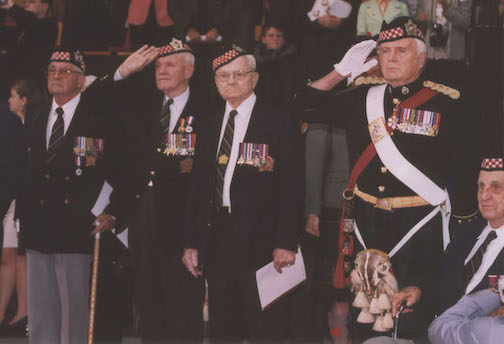 Col Earp and Argyll veterans salute during the trooping of the new Argyll Regimental Colours at Copps Coliseum, Hamilton, 2002.
Col Earp and Argyll veterans salute during the trooping of the new Argyll Regimental Colours at Copps Coliseum, Hamilton, 2002.
Message from the Regimental Historian
When I was working on the first tranche of Argyll poppies in November 2020, I happened to read through the appendices of the war diary for February 1945.
The battalion, including Lt Earp, had fought at Kapelsche Veer at the end of January and sustained substantial casualties. Alan wrote to his parents on the 31st: “I’ve been very busy and the going has been as tough as any. However, it’s all over now and I’m unscathed for which I’m most thankful and I’ve satisfied myself that I can take it and do my job. There’s very little I may say but everything’s fine now and all is past history.” A “sandwich & a mug of coffee” from Lloyd Colbourne, one of the Pioneers, had welcomed Alan back to the platoon “after a long, cold, tough stretch feeling done in.” News of home also raised his spirits. During his leave, Colbourne had spent some time with Alan’s parents.
Operation “Sister” – 13 February 1945
February brought cool, wet weather, a respite from fighting, and the resumption of patrolling. Brigade tasked the unit with patrols across the Maas River, both small, recce patrols and larger, fighting patrols. Lts Earp and McCutcheon of B Company conducted Operation “Sister” at 0400 hours on the 13th (see Lt Hugh John McCutcheon ). It was successful and not a shot was fired.
In 2002, Lt Earp was now Col Earp and his name appeared in various Regimental publications such as the veterans’ newsletter, the Albainn. It triggered Pte Ross “Red” Johnstone Bonson’s (1918–2011) memory, and he wrote up his recollection:
The name “Honorary Colonel Alan Earp”, which appears quite often these days, brings back memories of a night in early … 1945. I was on “standby” duty at the site where our 3” mortars were set up on a dyke along the Maas River, near Waalwijk, when the order came to lay down a smoke screen along the bank of the far side of the river.
A patrol consisting of members of the “Pioneers” (I think) … a prisoner. If my memory is correct – they had been successful in taking a prisoner and had just embarked on the trip back across the river when the enemy illuminated the area with flares and subjected the patrol to intense small arms fire.
Luckily, our mortars were already sighted on the coordinate for which the smoke had been requested so were able to respond almost immediate. After firing a sufficient number of smoke bombs to create a good screen we started to mix in a few H.E. [high explosive] to give the enemy something, other than firing at the patrol, to think about.
I don’t know how many bombs we expended that night but it must have been quite a few – I was kept busy continuously correcting the sights, my number 3 was preparing the bombs and number 2 was pouring them down the barrel as fast as humanly possible. When we received the “quit-firing” order, the baseplate had been driven 6”-8” down into the frozen soil.
A short time later, when we were busy straightening things up, a young Lieut. (who I don’t believe I had ever seen before) appeared out of the darkness (again – if my memory is correct) – the ensuing, short conversation was:
Lieut: Thanks for the smoke.
Bonson: No thanks needed Sir, we are glad we were able to help. Did everyone get out O.K.?
Lieut: A couple of minor injuries but I am certain they will recover. Well – we did appreciate the help. Good night.
Bonson: Good night Sir.
The next day when I tried to find out who the young Lieut. was I was told that it was most likely Lieut. Earp, of the “Pioneers”, who had just transferred to the “Argylls” a short time ago.
The reason this small episode is still fairly clear in memory is – it was the first (and last) time anybody said “thank you” to us for just doing our job. In addition he had come quite a distance out of his way to say it.
On occasion I had heard a few disparaging remarks when a bomb had fallen short. I do not blame the rifle companies for being upset when it happened – their job was tough enough without having to contend with, so called, friendly fire.
I still wonder if the Officer was, indeed, Lieut. Earp. I could barely see him in the darkness – at least not well enough to recognize in daylight, but whoever it was the thoughtful act is still in my memory after all these years.
I sent a copy to Col Earp and enquired if he remembered it:
I don’t remember thanking the Mortars. But you were kind enough to send me a copy of a very kind note from an Argyll then in BC and it certainly sounded like young Earp.
Operation “Cousin” – 18 February 1945
Five days later, on the 18th, Lts Earp and Bill Shields conducted another fighting patrol, Operation “Cousin,” a “fighting recce patrol.” The appendices to the war diary contain the detailed orders for the patrol in Lt-Col Fred Wigle’s own hand. I hadn’t included it in Black yesterdays, which had the orders for “Sister” and the report on it in full. I had forgotten about it and asked Alan if it “rang any bells.”
His response was immediate:
Oh, Yea! Many bells. I have always remembered it as on my birthday (but I think BY places it a day or two earlier). We were billeted in a very damaged bakery in Loon op Zand. The “boys” discovered it would be my birthday (actual 20, “virtual” 21st – I was always nervous about being found out). They conspired with the Baker, who produced a wonderful birthday cake with butter cream icing, and 1 candle! I can still see its miraculous appearance in the shattered shop where we were bivouacking. Knowing I was going across the Maas, they wished me “Many Happy Returns!”
The crossing was less scary than the earlier one with McCutcheon (but scary enough, with strong currents, flooded polder, sunken barbed wire which played hob with canvas boats, and fear of sudden illumination).
We made “harbour” and [Lt Bill] Shields [D Company] and his men headed, very cautiously, towards the dyke, while we protected the boats. In due course they returned without having encountered any one.
It would be some 50 years later, in the Mess, that Bill told me that he had not gone up to the dyke, since he had calculated that it simply wasn’t worth the very considerable risk, and we were pulling out the next day (!). I am grateful he didn’t tell me at the time, as I would have been horrified. By then, I was even more grateful for and appreciative of his decision. It was absurd to be risking so much, and so many, to such little purpose.
The patrol set out at 0300 hrs and returned at 0530 hrs “without encountering any enemy.” The early morning birthday cake and the accompanying wish of “happy returns” had been worth it. Lt Earp did have a happy return!
By the end of the month, the battalion, including Lt Earp and the Pioneers, saw heavy fighting in the Hochwald Gap and then at Veen in early March. Two Pioneers were wounded by Schu mines at Veen on 7 March, two were killed at Friesoythe on 14 April, and Alan was badly wounded. There will be more written on Veen in the future and on Friesoythe in the next tranche of Argyll poppies.
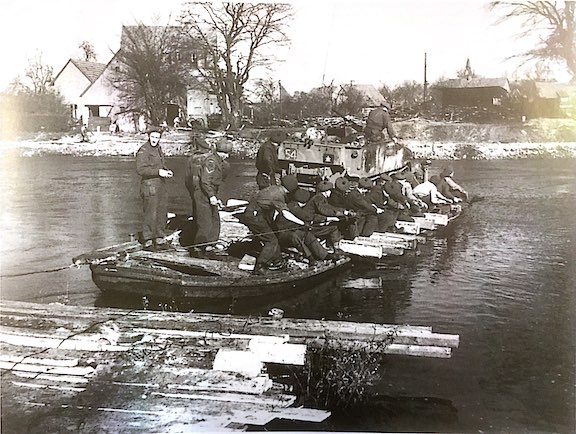 Crossing the Ems, 8 April 1945. Lt Alan Earp (in the centre with a pistol on his side) and the Pioneer Platoon ferry vehicles.
Crossing the Ems, 8 April 1945. Lt Alan Earp (in the centre with a pistol on his side) and the Pioneer Platoon ferry vehicles.
The view of the crossing was taken several hours after Capt Malcolm “Mac” Smith was shot and killed while standing next to Earp. The hostile shot came from the wood visible on the far side.
Over the course of the Black yesterdays project, I met and spoke with several Pioneers: ASgt John Dickson, “Big” Jim Dixon, Ben Bowland, and Harry Turner. To a man, they spoke highly of young Lt Earp as a soldier and a man. The phrase “real gentleman” was repeated often. Alan described “Big” Jim Dixon in a letter to his parents and sister on 13 April 1945:
My driver and bodyguard, Big Jim Dixon, will probably be phoning you from London – if he’s not too high. He’s a pretty wild lad but awfully useful to have around when there’s shooting to be done.
About 15 years ago, Big Jim’s daughter called me about some wartime photos she was considering donating to the museum. Her mother was in the background during the call. Towards the end, she told me that her father spoke frequently of Lt Earp and always with the highest praise. Big Jim’s widow yelled out: “And Big Jim was a lot of things, but he was never a BS-er!”
Col Earp’s considerable achievements in this life as a senior university administrator and longtime president of Brock University have been appropriately recognized. Capt Sam Chapman once said that the respect of the men you led in battle is worth more than a medal any day, and Lt Earp earned it during his time in battle.
Capt Malcolm Stewart “Mac” Smith was, as Capt Claude Bissell put it, a “beloved” Argyll officer. Mac was killed on 8 April 1945 with Alan Earp at his side. Mac Smith had a fondness for limericks. I recently found out that quite often they were joint productions with Bissell. Indeed, when I interviewed him in 1984, he recited, with considerable self-satisfaction and amusement, the limerick relating to Loon op Zand, where young Lt Earp celebrated with the Pioneers his 20th birthday. I recall only the first and last lines of the limerick now, but I offer up a modest celebratory one for Alan in the style of Smith/Bissell, with apologies to all for a bit of grammatical malfeasance.
18 February 1945 – a young Argyll lieutenant’s birthday
The Argylls sent a fighting patrol from Loon op Zand
Young Earp and Bill Shields in command
They crossed the freezing Maas
Without hesitation or pause
Earp’s 20th birthday celebrations had began.
Happy birthday, “young Earp.”
Albainn,
Robert L. Fraser
Regimental Historian
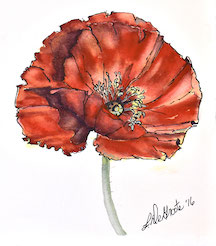
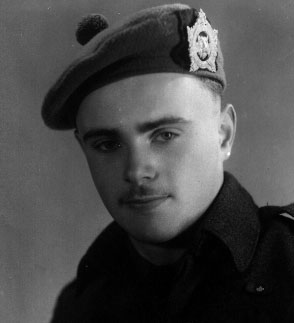 Young Lt Earp, 1944.
Young Lt Earp, 1944.
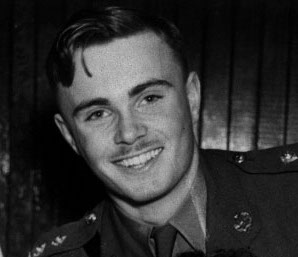 Lt Earp before his posting overseas.
Lt Earp before his posting overseas.
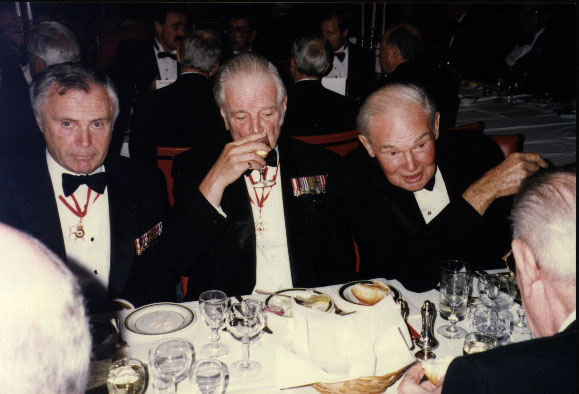 Officers’ Mess Dinner, 1986. Left to right: Lt Alan Earp, OC; Capt Claude Bissell, CC; Maj Bob Paterson.
Officers’ Mess Dinner, 1986. Left to right: Lt Alan Earp, OC; Capt Claude Bissell, CC; Maj Bob Paterson.
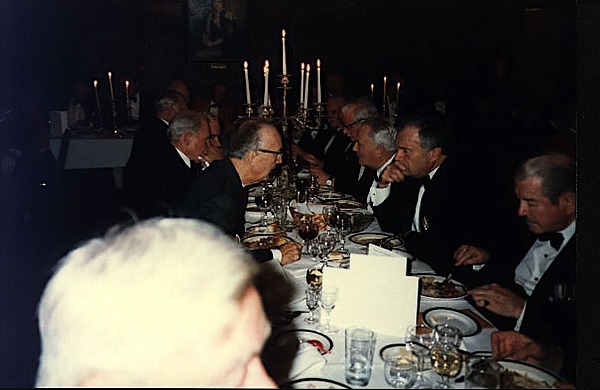 Officers’ Mess Dinner, 1987. At centre left, leaning forward: H/Capt Charlie Maclean. At centre right: Lt Alan Earp, OC.
Officers’ Mess Dinner, 1987. At centre left, leaning forward: H/Capt Charlie Maclean. At centre right: Lt Alan Earp, OC.
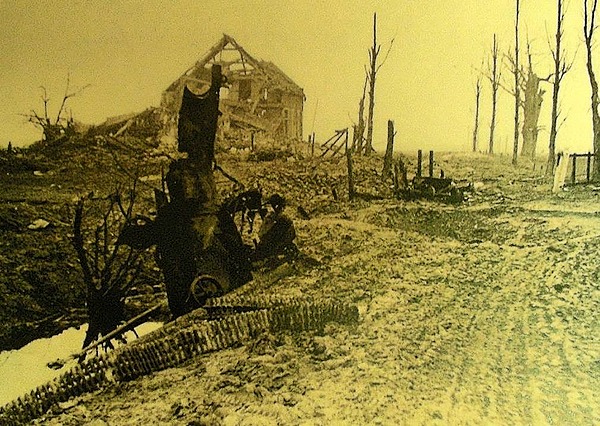 Kapelsche Veer, 1945.
Kapelsche Veer, 1945.
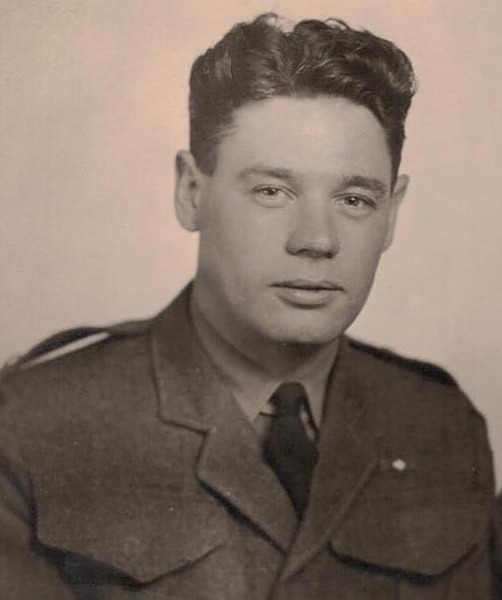 Lt Bill Shields (courtesy of Richard W. Shields).
Lt Bill Shields (courtesy of Richard W. Shields).
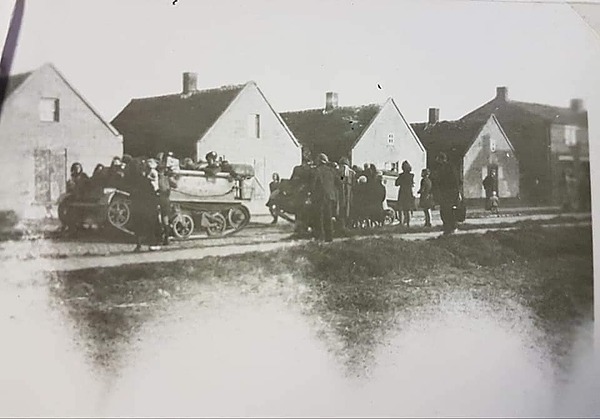 Carriers at Loon op Zand. There are balmorals in the first carrier.
Carriers at Loon op Zand. There are balmorals in the first carrier.
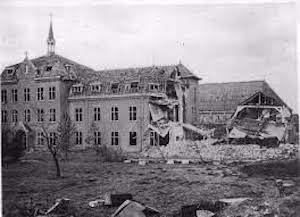 Destruction at Loon op Zand, 1945.
Destruction at Loon op Zand, 1945.
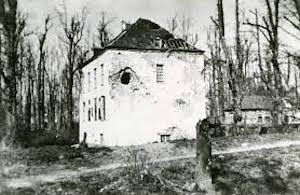 Destruction at Loon op Zand, 1945.
Destruction at Loon op Zand, 1945.
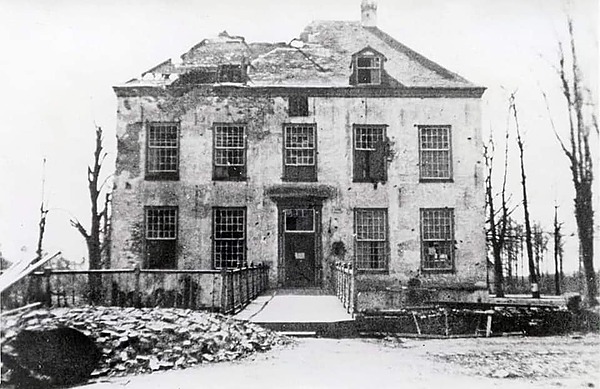 Destruction at Loon op Zand, 1945.
Destruction at Loon op Zand, 1945.
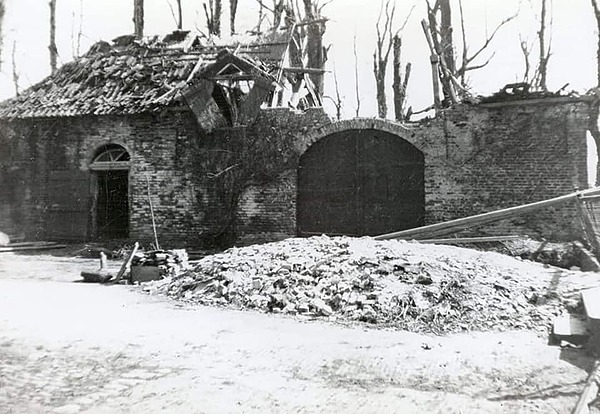 Destruction at Loon op Zand, 1945.
Destruction at Loon op Zand, 1945.
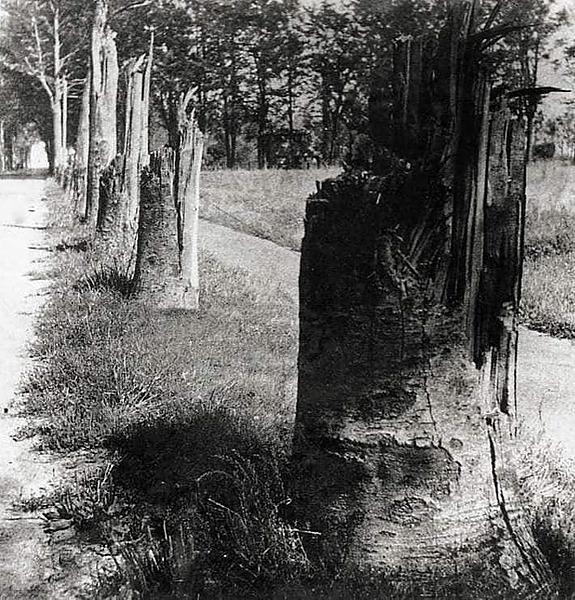 Destruction at Loon op Zand, 1945.
Destruction at Loon op Zand, 1945.
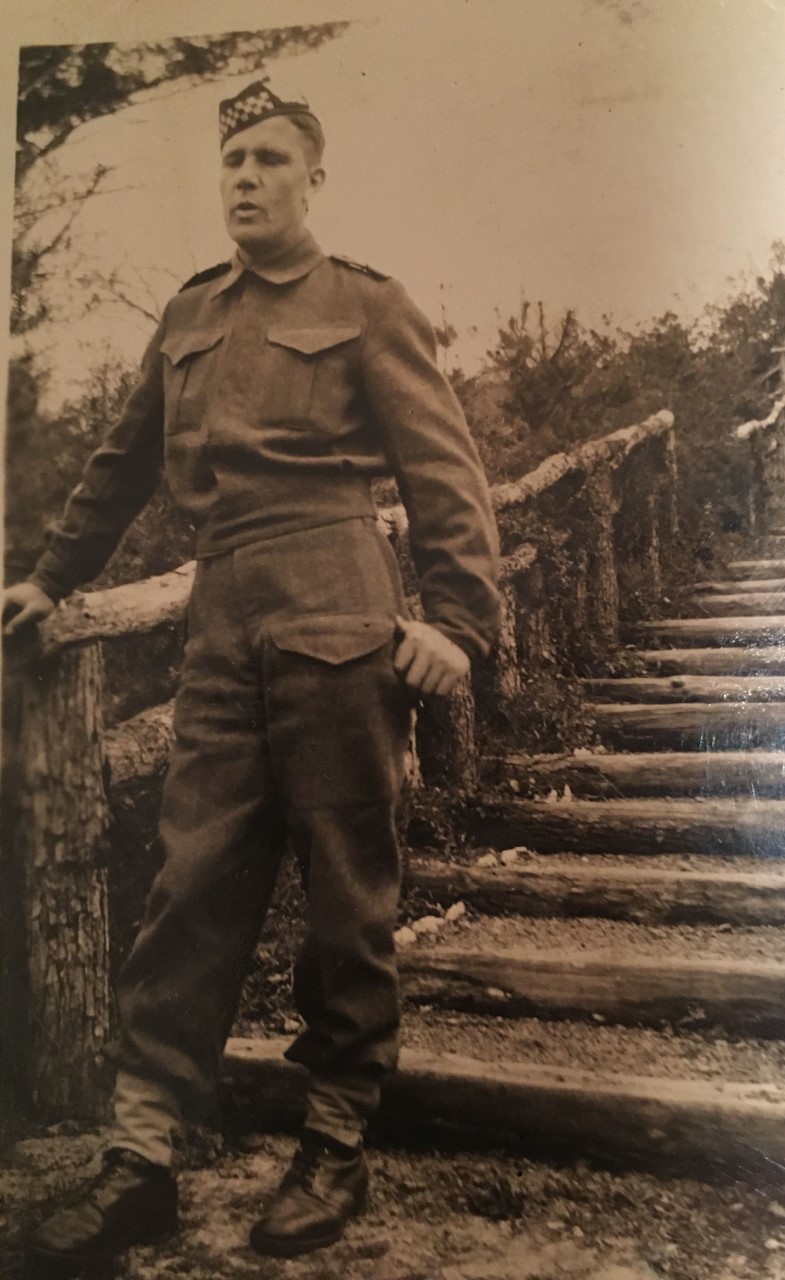 John Dickson.
John Dickson.
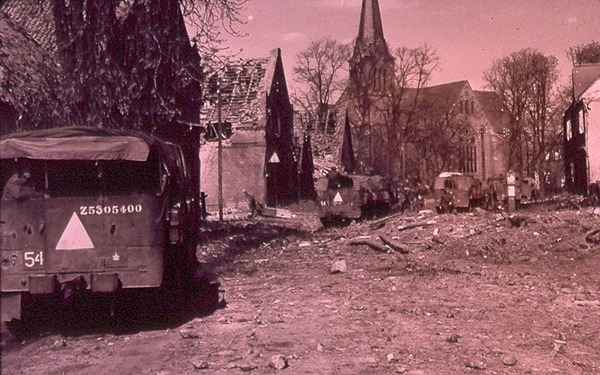 Friesoythe, 14 April 1945.
Friesoythe, 14 April 1945.
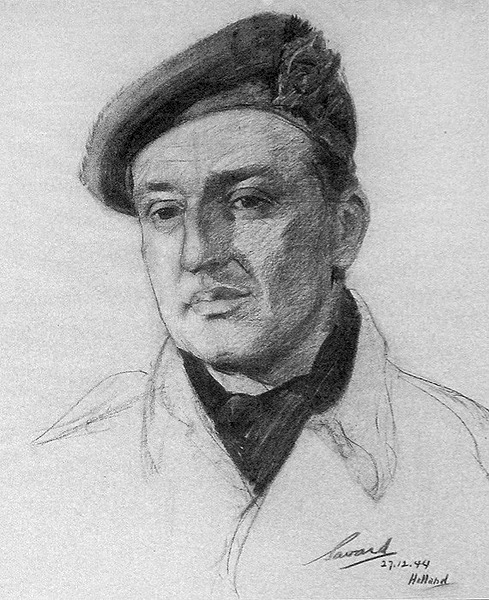 Charcoal sketch of Capt Malcolm (Mac) Stewart Smith, OC, Support Company (KIA 8 April 1945) by Pte F.T.V. Savard, Intelligence Section.
Charcoal sketch of Capt Malcolm (Mac) Stewart Smith, OC, Support Company (KIA 8 April 1945) by Pte F.T.V. Savard, Intelligence Section.